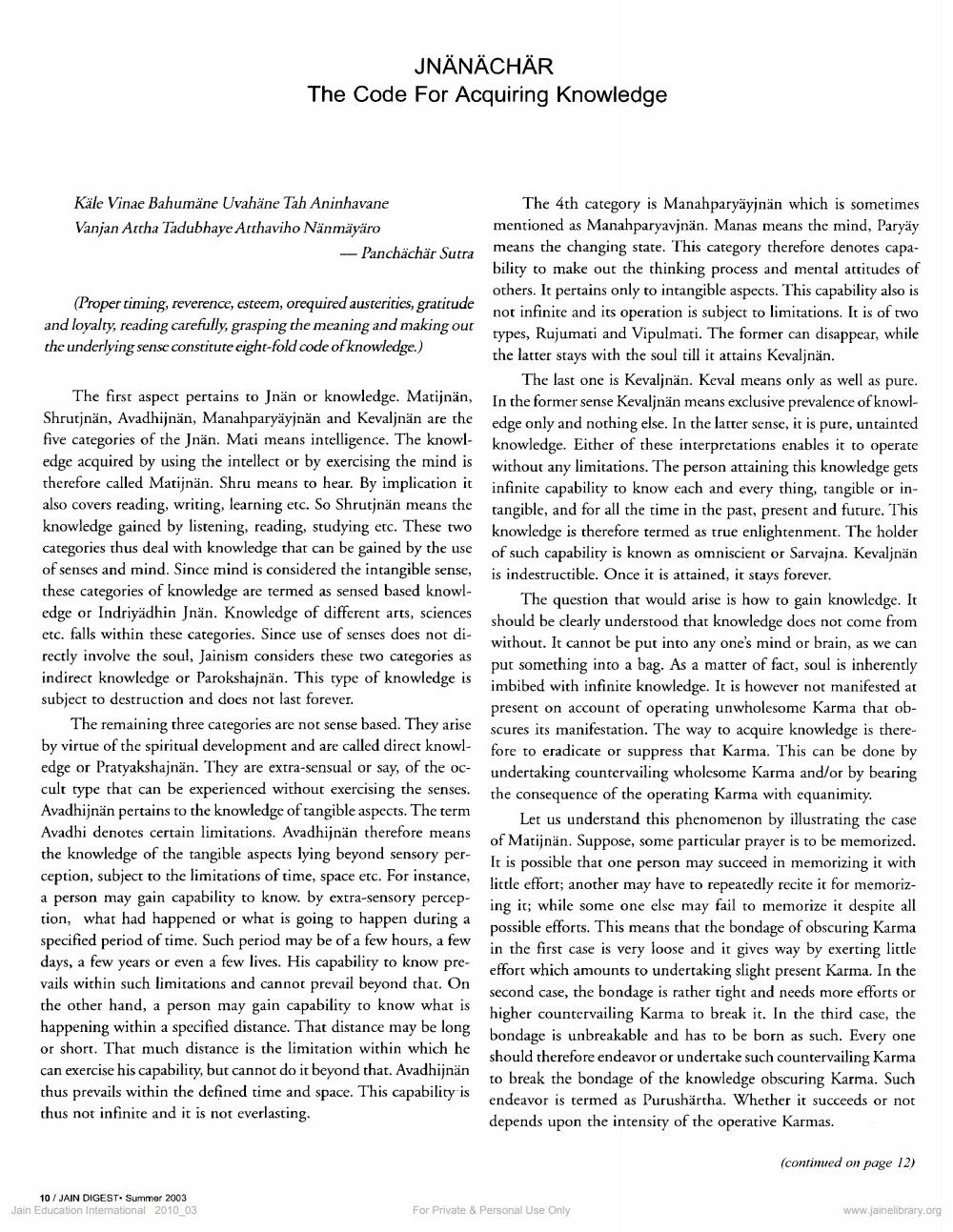________________
JNÄNÄCHÄR The Code For Acquiring Knowledge
Käle Vinae Bahumäne Uvahäne Tah Aninhavane Vanjan Attha Tadubhaye Atchaviho Nänmäyäro
- Panchächär Sutra
(Proper timing, reverence, esteem, orequired austerities, gratitude and loyalty, reading carefully, grasping the meaning and making out the underlying sense constitute eight-fold code of knowledge.)
The first aspect pertains to Jnän or knowledge. Matijnän, Shrutjnän, Avadhijnän, Manahparyäyjnän and Kevaljnän are the five categories of the Jnän. Mati means intelligence. The knowl- edge acquired by using the intellect or by exercising the mind is therefore called Matijnän. Shru means to hear. By implication it also covers reading, writing, learning etc. So Shrutjnän means the knowledge gained by listening, reading, studying etc. These two categories thus deal with knowledge that can be gained by the use of senses and mind. Since mind is considered the intangible sense, these categories of knowledge are termed as sensed based knowledge or Indriyadhin Jnän. Knowledge of different arts, sciences etc. falls within these categories. Since use of senses does not directly involve the soul, Jainism considers these two categories as indirect knowledge or Parokshajnän. This type of knowledge is subject to destruction and does not last forever.
The remaining three categories are not sense based. They arise by virtue of the spiritual development and are called direct knowl- edge or Pratyakshajnän. They are extra-sensual or say, of the oc- cult type that can be experienced without exercising the senses. Avadhijnän pertains to the knowledge of tangible aspects. The term Avadhi denotes certain limitations. Avadhijnän therefore means the knowledge of the tangible aspects lying beyond sensory perception, subject to the limitations of time, space etc. For instance, a person may gain capability to know. by extra-sensory perception, what had happened or what is going to happen during a specified period of time. Such period may be of a few hours, a few days, a few years or even a few lives. His capability to know prevails within such limitations and cannot prevail beyond that. On the other hand, a person may gain capability to know what is happening within a specified distance. That distance may be long or short. That much distance is the limitation within which he can exercise his capability, but cannot do it beyond that. Avadhijnän thus prevails within the defined time and space. This capability is thus not infinite and it is not everlasting.
The 4th category is Manahparyäyjnän which is sometimes mentioned as Manahparyavjnän. Manas means the mind, Paryäy means the changing state. This category therefore denotes capability to make out the thinking process and mental attitudes of others. It pertains only to intangible aspects. This capability also is not infinite and its operation is subject to limitations. It is of two types, Rujumati and Vipulmati. The former can disappear, while the latter stays with the soul till it attains Kevaljnän.
The last one is Kevaljnän. Keval means only as well as pure In the former sense Kevaljnän means exclusive prevalence of knowledge only and nothing else. In the latter sense, it is pure, untainted knowledge. Either of these interpretations enables it to operate without any limitations. The person attaining this knowledge gets infinite capability to know each and every thing, tangible or intangible, and for all the time in the past, present and future. This knowledge is therefore termed as true enlightenment. The holder of such capability is known as omniscient or Sarvajna. Kevaljnän is indestructible. Once it is attained, it stays forever.
The question that would arise is how to gain knowledge. It should be clearly understood that knowledge does not come from without. It cannot be put into any one's mind or brain, as we can put something into a bag. As a matter of fact, soul is inherently imbibed with infinite knowledge. It is however not manifested at present on account of operating unwholesome Karma that obscures its manifestation. The way to acquire knowledge is therefore to eradicate or suppress that Karma. This can be done by undertaking countervailing wholesome Karma and/or by bearing the consequence of the operating Karma with equanimity.
Let us understand this phenomenon by illustrating the case of Matijnän. Suppose, some particular prayer is to be memorized. It is possible that one person may succeed in memorizing it with little effort; another may have to repeatedly recite it for memorizing it; while some one else may fail to memorize it despite all possible efforts. This means that the bondage of obscuring Karma in the first case is very loose and it gives way by exerting little effort which amounts to undertaking slight present Karma. In the second case, the bondage is rather tight and needs more efforts or higher countervailing Karma to break it. In the third case, the bondage is unbreakable and has to be born as such. Every one should therefore endeavor or undertake such countervailing Karma to break the bondage of the knowledge obscuring Karma. Such endeavor is termed as Purushärtha. Whether it succeeds or not depends upon the intensity of the operative Karmas.
(continued on page 12)
10/JAIN DIGEST. Summer 2003 Jain Education International 2010_03
For Private & Personal Use Only
www.jainelibrary.org




